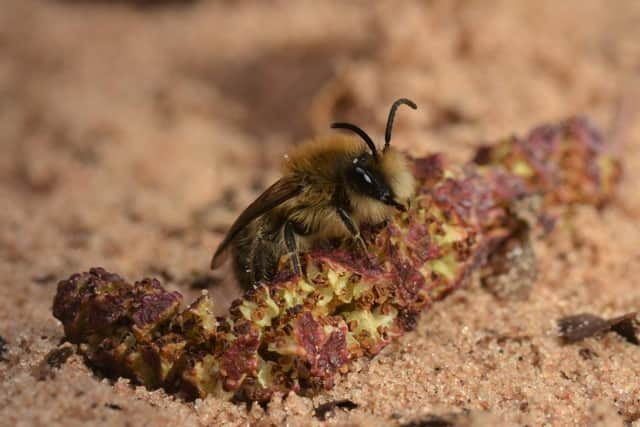Rare species of bee discovered in Warwickshire for the first time
and live on Freeview channel 276
A rare species of bee has been discovered at Ryton Pools Country Park, marking the first time that the bee has been recorded in Warwickshire.
Colletes cunicularius, also known as the Spring Plasterer Bee, is a solitary, early-spring bee species that typically nests in very sandy soil, feeding predominantly on sallow blossoms.
Advertisement
Hide AdAdvertisement
Hide Ad

It has a distinctive fluffy face, and its nesting behaviour involves digging tunnels in the ground, which they line with a cellophane-like material.
The list of bee species at Ryton Pools now stands at 82 and the discovery of Colletes cunicularius was made during a survey conducted by Warwickshire Country Parks Ranger George Humphrey, who carries out regular monitoring of insect populations in the area.
He identified a single male in early March, and the ranger team has since confirmed a population of the bees in the same area.
Warwickshire County Council said its ranger team continually work to develop a welcoming environment for bees at Ryton Pools. They build bee hotels, plant wildflower-rich pond edges, and seed new wildflower meadows.
Advertisement
Hide AdAdvertisement
Hide Ad2021 was the first full year of bumblebee transects (or 'BeeWalks') at Ryton Pools Country Park. In a transect, a recorder walks along the same fixed path regularly, counting bees along the way and making a note of their species.
The route is walked at least monthly from March to October and covers key areas of the site to ensure that there are sections of hedgerow and meadow in flower all year round, and also that there is high flower diversity during the peak season.
The bumblebee transects are part of a national scheme run by the Bumblebee Conservation Trust.
George Humphrey, the Warwickshire Country Park Ranger who made the discovery, said: “The discovery of Colletes cunicularius at Ryton Pools was a wonderful and unexpected start to the 2023 bee recording season.
Advertisement
Hide AdAdvertisement
Hide Ad"The park is one of the few places in Warwickshire with suitable conditions for this bee, which highlights the importance of preserving the unique habitats in all of Warwickshire’s country parks and green spaces.
"I am proud to be part of a team working to ensure our park’s ecosystems continue to support a range of species, including the Spring Plasterer Bee.”